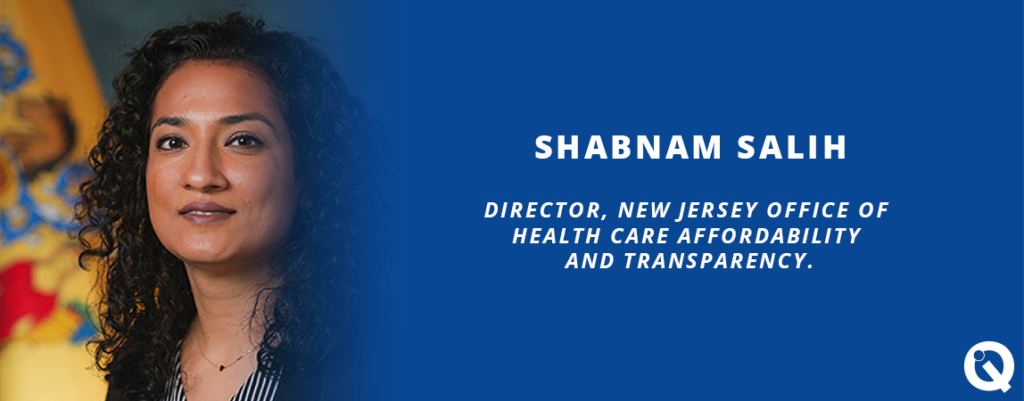Shabnam Salih is the Director of the New Jersey Governor’s Office of Health Care Affordability and Transparency.
How did you first become involved in health policy work?
Like all of us, I’m very much shaped by my personal experiences. I’m proud to be the daughter of immigrants. My older sister has a disability and is an amazing self- advocate, and my father has suffered for a long time, and still does, with diabetes. These are some of the experiences that opened my eyes from a young age to the disparities and unequal challenges some face every day. I am passionate about policy work through a social justice and reform lens because of it.
My four and a half years at the Camden Coalition and working with Dr. Jeffrey Brenner helped build my knowledge of health care policy with a particular focus on the social impacts on our health. Health care continues to be a social justice issue. I wish it wasn’t, but it is. It’s still too expensive for many people, many families, and many employers. I want to keep that social justice frame as I move forward with my career in health care.
You are the first director of the relatively new Governor’s Office of Health Care Affordability and Transparency. What are your 2021 priorities for the Office?
I was appointed director in February, 2020. And just one month later we had the first confirmed case of COVID in the state. Over the last year, the administration has made several policy changes to ensure affordability and accessibility for residents as they deal with the pandemic, such as removing cost sharing barriers to COVID-19 testing and related services, where possible, and ensuring broad access for telehealth and tele-mental health. Anecdotally, we are hearing such positive things about the increased access to critical services through telehealth and tele-mental health since it removes some access barriers like transportation or childcare. Further, the launch of the State Based Exchange by the Department of Banking and Insurance as well as the implementation of state level subsidies has been critical to ensuring access and more affordable coverage options.
If ever there was a time to embrace health care transformation, it’s now, and the Governor’s Executive Order #217 sets up a framework for a significant body of health care affordability work in the state. The administration, across departments, has made a significant difference in the affordability space over the last three years, but we recognize there’s a lot more to do.
Tell us about Executive Order 217 and your work on health care affordability. We understand that New Jersey recently joined a multi-state partnership focused on addressing health care affordability. The Quality Institute, along with many of our members, is part of this work and serves on the Health Care Affordability Advisory Group.
EO #217 sets up a Health Care Affordability Interagency Work Group, a Health Care Affordability Advisory Group, and sets us on the path to developing a health care cost growth benchmark. The data will help us not only monitor cost growth, but also develop opportunities for value-based care and other quality improvements to care.
The partnership will focus on supporting the State in our development of an annual cost growth benchmark for health care costs statewide. We’ll have conversations with other states as well … Oregon, Washington, Connecticut, and Nevada are also participating. Each state is in a slightly different place. And I think, ultimately, we recognize that each state will develop the model that is best for them. It’s valuable to be in this cohort of states committed to addressing this issue.
We also will have hospitals and providers who are critical to the conversation. We have payers and employers and consumer advocates. The combination of folks from delivery systems to payers and advocates will make for a robust conversation.
At the Quality Institute, we advocate for greater transparency around both prices and quality. What data do you wish you had greater access to and how would it accelerate attaining better quality, equity, or affordability?
There’s the famous quote, “If you can’t measure it, you can’t improve it.” We want every resident of New Jersey to have access to high quality affordable care. So getting our hands around the data is a critical piece to helping us get there. We need to understand our health care cost drivers and the trends; where are they growing the fastest, etc.
We need to better understand what’s happening in terms of value and quality of care. Are we delivering services efficiently? And where are the opportunities for improvement? Equity is also an important part of the conversation and getting data to better understand where there’s underinvestment or opportunities to address some of those disparities is also critical.
So finally, we do like to ask for information beyond a person’s professional life. Where will we find you on your day off?
That’s easy. I’ll be with my children, who are six and 10. We’ll be outside, maybe on a hike. We like to get outside as often as we can, especially now as the weather is getting nicer.

